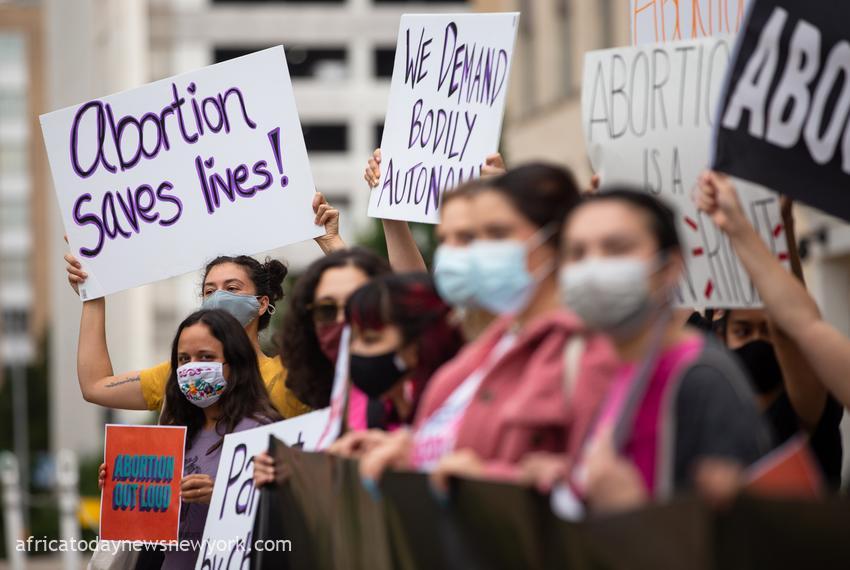With a revisit to the fray once more, the US Supreme Court evaluates measures concerning the predominant medication employed nationwide for terminating pregnancies, injecting renewed momentum into the debate over abortion rights.
Under scrutiny, the US Supreme Court weighs measures that could impact the availability of abortion pills, prompting widespread discussion.
Having shifted to a conservative-leaning composition after nullifying the constitutional abortion right nearly two years ago, the court is poised to discuss oral arguments regarding access to the abortion pill mifepristone.
Groups opposed to abortion are pushing for the drug’s prohibition, arguing that despite its lengthy use, it remains unsafe.
In the year 2000, the Food and Drug Administration approved Mifepristone’s usage, and data from the FDA suggests that over 5.9 million individuals in America have turned to it for terminating pregnancies in the years that followed.
At the heart of the matter lies a decision made last year by a conservative US District Court judge in Texas, selected by former Republican president Donald Trump, seeking to outlaw mifepristone.
Even though a conservative-majority appeals court revoked the total ban due to the statute of limitations expiring on challenging the FDA’s approval, access to the medication was nonetheless curtailed.
In a move to challenge the lower court’s restrictions on mifepristone, Danco Laboratories, the manufacturer of the medication, and the administration of Democratic President Joe Biden appealed to the Supreme Court.
With conservatives holding a 6-3 majority, the nation’s highest court intervened by freezing the lower court’s rulings, ensuring the drug’s continued availability on the market for now.
The FDA greenlit mifepristone for pregnancies of up to seven weeks in 2000, and later in 2016, regulations were eased, enabling its application to be extended to 10 weeks.
In response to the Covid pandemic in 2021, the FDA waived in-person dispensing requirements, allowing for the drug to be distributed by mail and prescribed remotely through telemedicine.
Read also: US Supreme Court Agrees To Rule On Abortion Pill Restrictions
According to the appeals court decision, the legal limit for mifepristone usage would be rolled back to seven weeks, with mail delivery blocked and doctor-prescribed administration mandated.
Part of the legal team at Covington & Burling, lawyer Lewis Grossman, who contributed to a brief presented to the Supreme Court by a consortium of food and drug law experts, refrained from speculating on the potential decision of the nine justices.
But if the court upholds the appeals court ruling they “would be doing something that I think would be very unprecedented,” Grossman said.
“They would be imposing restrictions on the availability of a drug based on a disagreement with the scientific experts at FDA.”
The latest legal skirmish over reproductive rights comes as abortion pill use is on the rise in the United States.
Medication abortion accounted for 63 percent of the abortions in the country last year, up from 53 percent in 2020, according to the Guttmacher Institute.
The actual number is likely higher, the institute said, because the figures do not take into account self-managed medication abortions outside the health care system or pills mailed to women in states where abortion is banned entirely.
“Reinstating outdated and medically unnecessary restrictions on the provision of mifepristone would negatively impact people’s lives and decrease abortion access across the country,” said Amy Friedrich-Karnik, Guttmacher’s director of federal policy.
Around 20 states have enacted prohibitions or constraints on abortion since the Supreme Court’s June 2022 overturning of the pivotal Roe v. Wade ruling, which had upheld the constitutional right to abortion for fifty years.
Numerous polls consistently reveal that a significant majority of Americans advocate for ongoing access to safe abortion, despite conservative factions’ efforts to curtail or outlaw the procedure altogether.
The Supreme Court is likely to announce its ruling on the abortion pill case by the end of June, just four months before the presidential election, during which abortion is expected to be a significant focal point.

